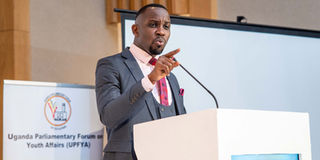Prime
Accept criticism for better leadership - LoP

The Leader of Opposition in Parliament Mr Joel Ssenyonyi. Photo | Roland D. Nasasira
What you need to know:
- Mr Ssenyonyi also noted that one of the most important tools young people can make use of are online platforms, digital spaces and social media to share ideas and thoughts to reach wide audiences, platforms he said the government is instead fighting
The Leader of Opposition in Parliament, Mr Joel Ssenyonyi has advised leaders at all levels to accept criticism as an avenue to become better leaders. The youthful opposition leader explained that leadership without criticism yields all but dictatorship and poor governance by the state against its citizens.
Mr Ssenyonyi also noted that one of the most important tools young people can make use of are online platforms, digital spaces and social media to share ideas and thoughts to reach wide audiences, platforms he said the government is instead fighting.
“For about four years now, the government decided to ban Facebook simply because the Head of State was annoyed that young people were criticising him on social media. If you cannot stand the heat, get out of the kitchen. As leaders, we must get to a place where it is okay for people to criticize us. Otherwise, don’t be a leader because some will agree with you and some will disagree with you. As a leader, it is important that you defend the rights of those who disagree with you,” Ssenyonyi said.
Mr Ssenyonyi made these remarks on Wednesday during the opening of the second annual two-day national youth symposium at Four Points by Sheraton in Kampala. Organised under the theme of redefining governance and political inclusivity in Uganda. The symposium aimed at collecting ideas to revamp the governance system by advocating for systemic changes through promoting the adoption of proportional representation, aiming to diversify and strengthen the political landscape, as well as combating gender-based violence in politics and advocating for measures to encourage women's active participation.
On her part, Ms Phiona Nyamutoro, the chairperson of the Uganda Parliamentary Forum on Youth Affairs (UPFYA) observed that inclusivity for young people in youth participation means information and open civic spaces to answer the questions on how informed the youth are about political surroundings and how best to contribute to addressing community challenges.
“If we have all youth channel their energy to having positive answers to these questions, we shall not just have a changed generation but young people centralising their voices to contributing to sustainable human development. It is then that they (young people) can stand their ground and argue that they deserve better to contribute to the future of Uganda,” Nyamutoro said.
In his keynote address about the perspectives of youth participation in shaping Uganda’s democratic landscape, Fred Mukasa Mbidde, the Deputy President of the Democratic Party said that much as Uganda holds periodic elections every five years, the quality and statement of the voter is not actually what is replicated in the announcement of results.
“What we have is not entirely a dictatorship, and it is not even a democracy. It is a lie for someone to say Uganda is a democracy. There is the formation of registered political parties in an administration that is non-party. Not even the NRM is a party. It is a dogmatic cult but with a simplified and easily graspable catechism, with President Museveni as the high priest celebrating the mass. You don’t call that one a political party. By method of registration, all parties exist but some of you belong to political parties you regard bigger than others,” Mbidde said.
Mr Primus Atukwatse Bahigi, the Country Director of the Netherlands Institute for Multiparty Democracy (NIMD) that organised the symposium noted that in social affairs, inclusiveness entails non-discrimination of social groups and or involvement of all groups in governance.
“Political inclusiveness does not preclude competition for power as the hallmark of politics. It means that beyond contestation for power, and competing policy preferences, groups, parties or organisations and individuals have equal opportunity to acquire and exercise power and can influence policy making and resource allocation. Political inclusiveness is second to none in democratic governance,” Mr Bahigi observed.
While giving her concluding remarks, Rebecca Alitwala Kadaga, the First Deputy Prime Minister advised that the political environment shouldn’t have divides between men and women but rather identify areas of collaboration.
“What we need is a new dispensation because the issue of patriarchy is strong. We need to work hard to change patriarchal attitudes so that people can understand that we represent everybody. When you are a woman representative, you represent the district,” Kadaga said.
According to the 2014 national population and housing census, Uganda has the youngest population in the world, with 78 per cent of the population under the age of 35, and 20.6 per cent between 15 and 24 years old.




